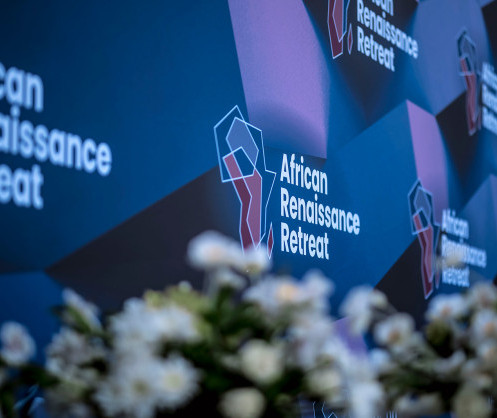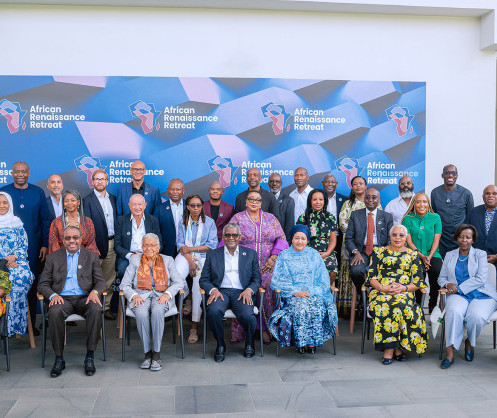The President and Chief Executive of the Pan-African conglomerate, Dangote Group (www.Dangote.com), Aliko Dangote, has called on African business leaders to take the lead in transforming the continent.
Speaking at the just concluded African Renaissance Retreat held in Kigali, Rwanda, Dangote pointed out that despite significant challenges besetting Africa, its youthful population and abundant resources, including about 30% of the world’s mineral reserves and the largest reserves of gold, cobalt, uranium, platinum, and diamonds, offer opportunities for substantial and inclusive growth.
“Additionally, we have 65% of the world’s arable land and 10% of the planet’s internal renewable freshwater sources. Together these present a myriad of opportunities for robust, inclusive growth that harness our abundant human potential and natural resources to increase prosperity, not just in Africa but across the globe,” he said. Dangote added that Africa is at a crucial inflection point, with the world’s youngest and fastest-growing population, rapidly expanding cities, and a growing embrace of innovation and new technologies, including Artificial Intelligence.
Dangote noted that despite dealing with multiple barriers such as visas, inconsistent change in government policies, inadequate technical talent, lack of critical infrastructure, foreign exchange crises, inflation, cost of capital and other conflicts of differing dimensions, the Dangote Group has expanded from Nigeria to 14 countries across the continent, spanning multiple sectors from cement to fertilizers, sugar to oil refineries, petrochemicals, agriculture and more. “The good news is that despite these challenges, we have succeeded in building a pan-African Group that employs over 50,000 people and generates revenues that should exceed $30bn by the end of 2025,” he said.
Dangote who initiated the retreat noted that he had long contemplated bringing together a group of dedicated African business leaders to address the continent’s challenges, identify concrete solutions, and showcase Africa as a viable investment destination despite its obstacles. He emphasized that the objective of the retreat was to offer an opportunity for collective action in tackling various issues, including persistent conflicts, energy and food security, supply chain disruptions, the debt crisis, and access to long-term concessional funding for development.
We are coming together not just as leaders in our respective institutions but as visionaries and catalysts for transforming our societies
“This small private and high-level gathering to discuss these issues and align on how we will own and shape our narrative for development is long overdue. With the foremost entrepreneurs on the continent, the leaders of the largest pan-African companies, those at the helm of the most important development institutions in Africa, our brothers and sisters leading global institutions, our leading investors, our pre-eminent civil society activists and a few of our most respected political leaders, this first step will be an opportunity to have a frank and honest dialogue amongst ourselves to consolidate what we see as our common ground” said Dangote. He added “we are coming together not just as leaders in our respective institutions but as visionaries and catalysts for transforming our societies. It is our collective responsibility to play our role in transforming our continent. Nobody will do it for us but us – especially us in this room”.
While expressing his hope that the retreat would produce initiatives capable of significantly shaping Africa’s future and benefiting its people, Dangote acknowledged the contributions of President Paul Kagame of Rwanda, former President Olusegun Obasanjo, former President Ellen Johnson Sirleaf, and former Prime Minister Hailemariam Dessalegn. However, he cautioned that it is crucial for the leaders present to move beyond dialogue to decisive implementation and tangible impact.
The Retreat participants resolved to urge African private sector and political leaders to engage in regular high-level dialogue. Additional proposals included supporting the ratification of the free movement of people protocol, launching the African Renaissance Companies Gender Compact, and convening top global business leaders of African descent. The leaders also aimed to champion an initiative aimed at significantly reducing logistics costs across the continent and one focused on ensuring internet access for a broader segment of Africa’s population.
Participants at the retreat , which took place from September 6 to 8, included Amina J. Mohammed, Deputy Secretary-General of the United Nations; Prof. Benedict Oramah, President and Chairman of the Board of Directors of the African Export-Import Bank; former Liberian President Ellen Johnson Sirleaf; Adebayo Ogunlesi, Chairperson of Global Infrastructure Partners; former Ethiopian Prime Minister Hailemariam Dessalegn, Samaila Zubairu of the African Finance Corporation, Makhtar Diop of IFC, and Jeremy Awori, CEO of Ecobank Transnational Incorporated.
Others were Bernie Mensah of Bank of America; Dr. James Mwangi of Equity Group Holdings; Alain Ebobisse of Africa50; Aigboje Aig-Imoukhuede of Access Holdings; Genevieve Sangudi of Alterra Capital Partners; Jim Ovia of Zenith Bank; Tony Elumelu of Heirs Holdings; Naguib Sawiris of Orascom Telecom Holding; Dr. Vera Songwe; Jonathan Oppenheimer of Oppenheimer partners; Dr. James Manyika of Google; Clare Akamanzi of NBA Africa; Fred Swaniker of Africa Leadership Group; Professor Hakeem Belo-Osagie of Harvard Business School; Myma Belo-Osagie of Harvard Africa Studies Centre; Patrice Motsepe of African Rainbow Minerals; Mohammed Dewji of METL; Moussa Faki Mahamat of Africa Union; Graca Machel of the Graca Machel Trust; Wamkele Mene of African Continental Free Trade Area Secretariat; Tope Lawani of Helios Partners; Masai Ujiri of the Toronto Raptors; Mimi Alemayehou of Three Cairns Group; Dr. Donald Kaberuka of Southbridge Group; Precious Moloi-Motsepe of Africa Fashion International; Richelieu Dennis of Sundial Group of Companies; Louise Mushikiwabo, Secretary General of Organisation Internationale de la Francophonie; Hassanein Hiridjee of Axian Group; Kate Fotso of Telcar Cocoa; Nkosana Moyo of Mandela Institute for Development Studies; Nku Nyembezi of Standard Bank Group.




